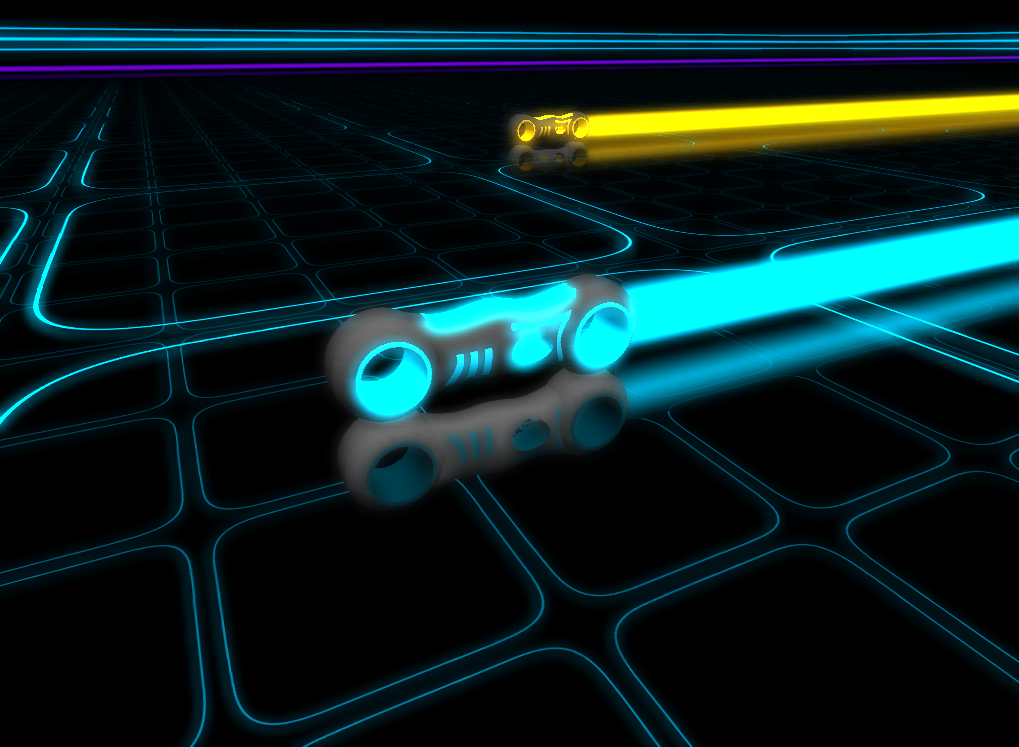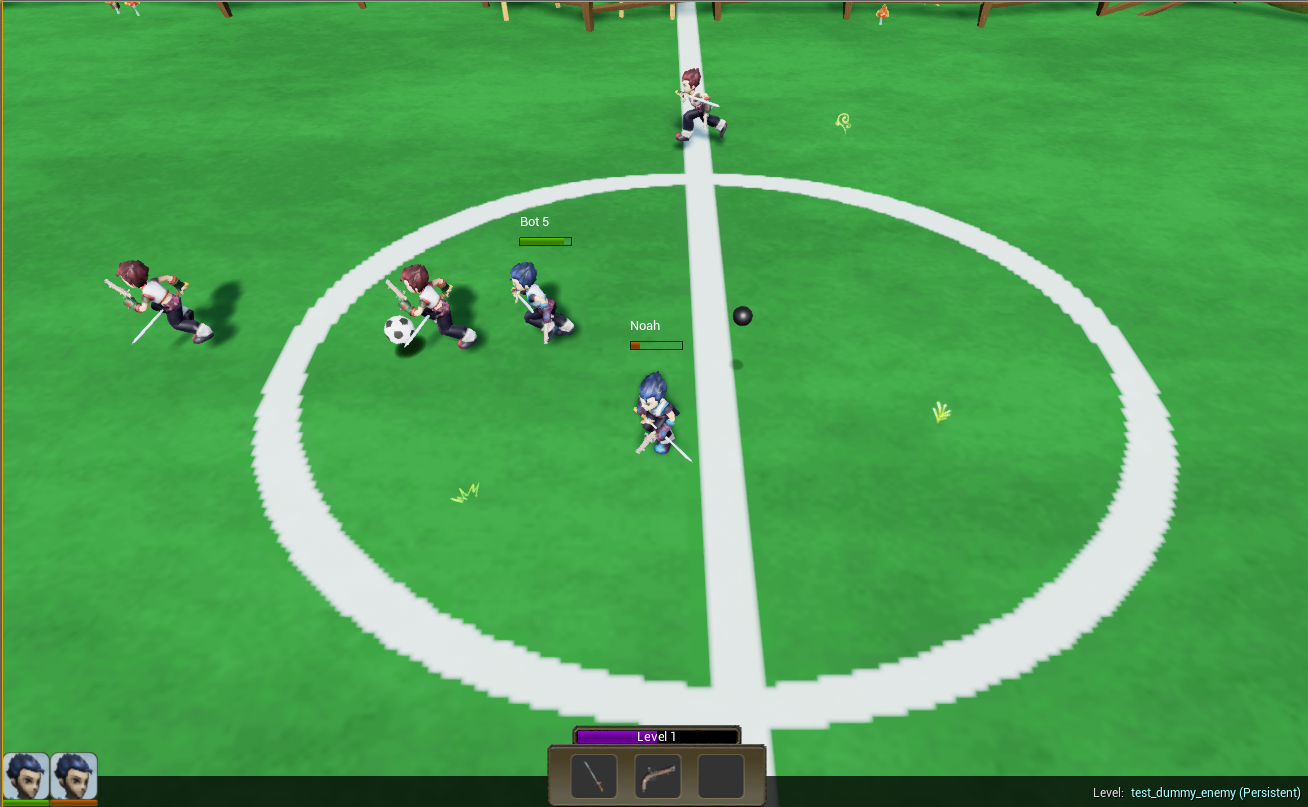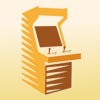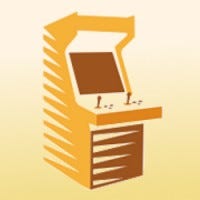
Featured Blog | This community-written post highlights the best of what the game industry has to offer. Read more like it on the Game Developer Blogs or learn how to Submit Your Own Blog Post
Gamieon: Ten years, One Programmer
A synopsis of all published and unpublished projects developed by the Gamieon studio and lessons learned thereof.

Though I've dabbled in game development since the late 1980's, it wasn't until October 26, 2004 that I incorporated Gamieon for fun, adventure, and maybe even a little profit. It's a part-time studio owned by myself and an investor who helps me cover expenses. Together we're the only employees of Gamieon. I do all the programming, releases, website maintenance, social networking and business upkeep. Tasks that are contracted out on a need-to basis include graphic, sound effect, music development and sometimes marketing. My full time job is medical software development; I've been employed by the same company for over seventeen years. I opted not to go into full-time gamedev largely because I don't want to leave my current job and because I like to treat gamedev as a hobby more than as a career (though it wasn't always that way).
Pre-Gamieon
I initially learned to program in BASIC with help from my father. Years later I learned how to program in C; mostly self taught but with some help from a friend on a local BBS I called frequently. I conceived of many projects but never finished any until around 1994 when I programmed and released "Flash Infiltrator;" a free ANSI war game you could play online a "Major BBS" real-time with up to five other players.

Within a year following I released "Flash Tankfire" which was a free Scorched Earth clone also playable online a Major BBS.

The development cycle was "code-and-fix" for all that time, and I didn't really think about collaborating with other developers. I was having fun on my own, and had not come across anyone else who wrote games. After those two games I turned my attention toward learning DirectX and engine development. I wrote a basic 3D video engine and a fast smooth voxel terrain renderer like that of the "Mars" voxel demo shown below:

Sadly I lost the code to those projects many years ago, so I have nothing to show for it here.
Later in college I developed and released "Cycles3D." The game is a free clone of the original Tron light cycle simulation. The initial release got thousands of downloads within the first day of being available; and later I discovered it was downloaded so many times that it created a distinct spike in campus network traffic for a short while. That was the legacy I left the University of Dayton with :).


You can still download it at http://www.cycles3d.com
College was also when I got a co-op job developing medical software. After graduation my boss set up a full-time game development studio called Astound for me because, back then, I wanted a full time job developing games and he thought it could be lucrative. It was a dream come true, and I jumped right in. At Astound I worked with another programmer on a 3D shooter called "Zeos Fighters."


After a year of work I deemed the project a failure and returned to medical software development. Its failure can be summed up in one sentence: I treated Astound like a programming exercise, not a game studio. The itch to develop games never went away, so I started development on a 3D physics puzzle game in my free time called "Dominoze." It was during development of that game that I founded Gamieon in order to formalize its development and collaborate with other developers under a corporate entity.
Gamieon's Unreleased Projects
(Number in parenthesis denotes most recent year of development)
Dominoze (2010)
http://www.indiedb.com/games/dominoze


Dominoze is a 3D physics puzzle game, and though unfinished, the crown jewel of my personal game development experience. In each level you figure out how to arrange objects in a scene such that all the dominoes can be knocked over in one continuous chain. I think the idea is amazing but the execution was poor. I spent nine years building the game, editor and engine (even writing a lightmapper from scratch) only to walk away from what became an endless cycle of feature creep and no direction.
You can read all about Dominoze at http://www.gamasutra.com/blogs/ChristopherHaag/20130312/188293/Dominoze_PC_Postmortem_Nine_Years_One_Programmer.php
Gamieon Construction Kit (2010)
http://www.indiedb.com/games/gamieon-construction-kit


This was a learning project for Unity network development and also an attempt to make a Rube Goldberg sandbox simulation consisting of physics and simple shapes. I like the underlying idea of a simulator where people can build and share contraptions online, but I never came up with a complete design. I abandoned it after a few months to move on to more exciting projects.
Cycles3D 2.0 (2012)
http://www.indiedb.com/games/cycles3d


I ported my old Cycles3D project to Unity on a whim to see how fast I could do it and to make it look pretty along the way. I stopped development because I lost interest, but it remains on GitHub at https://github.com/Gamieon/Cycles3D should anyone want to tinker with it.
Gauntlet Clone (2014)
(This project has no homepage)


This was my first immersion into Unreal 4 development. I wanted to make Unreal's cave fly-through demo into a small Gauntlet level. I did just that in a very short time; and it was fun to play even though players didn't take damage. I abandoned the project right after I made the video because I wanted to work on something else more original. All in all it was a good learning experience.
Field of Heroes (2015)
http://www.indiedb.com/games/field-of-heroes


This is my second Unreal 4 project, and one I'd like to see come to fruition someday with help from a big studio. FoH is a soccer game where players fight each other, literally, for control of the ball. Even if the project doesn't go anywhere, at least I got to learn how behavior trees and character animations generally work in modern game development tools. This project is in development at the time of this writing.
Gamieon's Released Projects
(Number in parenthesis denotes release year)
Tiltz (2010)
http://www.indiedb.com/games/tiltz


Tiltz is a simple mobile game where you tilt your device and pull incline ramps down with your finger to guide marbles into a barrel. It was my first venture into mobile development and my first released game that used the Unity engine. You can read more about it in the post-mortem (which I called "sunset" at the time) at:
http://www.indiedb.com/members/gamieon/blogs/game-sunset-report-tiltz
At the time of this writing it's still available on these platforms:
iTunes - http://itunes.apple.com/us/app/tiltz-deluxe/id460936061?ls=1&mt=8
Google Play - https://market.android.com/details?id=com.gamieon.tiltzdeluxe
Hyperspace Pinball (2011)
http://www.indiedb.com/games/hyperspace-pinball


The objective in this game, which is my second mobile and first desktop Unity game released, is to destroy aliens on the screen using pinball-like controls. It was my first attempt at a seriously successful mobile game, and my most successful game by download. You can read the post-mortem at:
At the time of this writing, you can still get it from these links:
iTunes - http://itunes.apple.com/us/app/hyperspace-pinball/id449062825?ls=1&mt=8
Google Play - https://play.google.com/store/apps/details?id=com.gamieon.hyperspacepinball
Desura - http://www.desura.com/games/hyperspace-pinball
BrassMonkey - http://playbrassmonkey.com/hyperspacepinball
Hamster Chase (2013)
http://www.indiedb.com/games/hamster-chase


Hamster Chase is a mobile accelerometer puzzle game where you tilt the device to get all the hamsters within their hamster balls onto their seed piles. It's my second attempt at a successful mobile game, and my first where I leverage a cartoony theme as many popular mobile games do. I commissioned Meta3D studios to do all the art, and NovyPR to do the release blast rather than trying to do both myself.
It did not reach the success I had hoped for, and I never wrote a post-mortem. I think the game would have done better had I released it as a free app designed around a solid in-app purchase model, and made regular updates to it with new features and achievements.
You can see the virtual hamster cage at http://www.gamieon.com/hammys/ and click on the hamsters. If you do it enough they may tell a joke!
You can get Hamster Chase from:
iTunes - https://itunes.apple.com/us/app/hamster-chase/id564548708?ls=1&mt=8
Google Play - https://play.google.com/store/apps/details?id=com.gamieon.hamsterchase
Windows Phone - http://www.windowsphone.com/en-us/store/app/hamster-chase/0a538986-ef86-49ad-bb39-9b1bb8e9de24
Domino Arena (2013)
http://www.indiedb.com/games/domino-arena


Have you ever had an idea for a game that floated around your head for over a year, and you knew it wouldn't be popular but you finally wrote it anyway just to get it out of your head? That's Domino Arena. The objective is to alter the course of falling dominoes that change color as they fall so that as many of them become your color as possible.
I released it just to see how it would do, and as expected it didn't garner a lot of interest. You can play it from:
iTunes - https://itunes.apple.com/us/app/domino-arena/id743797890?ls=1&mt=8
Google Play - https://play.google.com/store/apps/details?id=com.gamieon.dominoarena
GameJolt - http://gamejolt.com/games/arcade/domino-arena/18964/
Domino Arena - http://www.kongregate.com/games/gamieoninc/domino-arena
Paper Cowboys (2013)
http://www.indiedb.com/games/paper-cowboys/


This game marked a turn in my development philosophy. Instead of trying to develop a new concept, I decided to see how fast I could make an online stick-figure western platform shooter. I finished it in 48 total hours. You can play the released version at:
http://gamejolt.com/games/platformer/paper-cowboys/15184/
you can see the post-mortem at:
http://www.gamedev.net/blog/1606/entry-2256481-paper-cowboys-personal-48-hr-game-jam-post-mortem/
It received enough views and positive comments to motivate me into commissioning Meta3D studios a version with all new papercraft art. In another change of my development philosophy, I put the entire game design in their hands and limited my role only to programmer. This project is still in development at the time of this writing.
Tiltz Tournament (2014)
http://www.indiedb.com/games/tiltz-tournament


Skillz, a company developing a mobile multiplayer platform with real cash prizes, approached me about adding part of Tiltz to their lineup. Tiltz Tournament basically takes the Tiltz mini-game of trying to make marbles fall into point slots, and makes it so players can compete online and win money by getting the higher score.
I abandoned the project after a quiet release and after I lost personal interest in it. There is no post-mortem for this game. You can try it at:
iTunes - https://itunes.apple.com/us/app/tiltz-tournament/id792492685?mt=8
Downloads / Plays from Nov 30, 2010 - Jan 14, 2015
Tiltz
iOS - ~36,400
Android - 44,638
Hyperspace Pinball
iOS - ~18,080
Android - 96,922
Desura - 874
Hamster Chase
iOS - ~30,600
Android - 47,104
Windows Phone - 9,397
Domino Arena
iOS - ~4,870
Android - 2,615
GameJolt - 177
Kongregate - 457
Tiltz Tournament
iOS - 127
Paper Cowboys
GameJolt - 6,460
Total downloads/plays: ~298,720
Total income: (I'm omitting this number; I will say however that none of my projects have ever made a profit)
Some Lessons I've Learned
Few things can be as fun to a game developer as getting together with some friends and walking to a restaurant and back; all the while discussing ideas for video games.
Mentors are powerful allies in helping you learn how to develop games.
If you need a powerful game engine, first make sure you really need it and then look at third party solutions before you consider writing your own.
Careful planning and doing things right don't guarantee a successful, profitable release. It does however greatly increase your chances.
Development is very risky when you do it by yourself; there's nobody else around to error check your plans, your designs and your code.
There is always room for another popular game with simple graphics and addicting game play.
Learn and use source control early on. You'll thank yourself later.
If your goal is to make money, design the monetization model for your game as early as you start designing the game.
Graphics are great for getting attention; game play is great for keeping it.
Never underestimate the success of a game that users can mod.
Set goals and limits. Decide the project must be done in X months. Decide there will be between Y and Z levels, and don't be afraid to narrow things down along the way.
Avoid feature creep. It increases development time and takes time away from your more exciting future projects.
When you contract work out to other studios, they become an extension of your core team. Treat them with immediacy, courtesy and respect.
A professional is just that because they make the difficult look easy.
Maintain a news feed for your projects early on. More exposure time means more time to get new readers, and more of a chance for big media sources to take notice and write about your game.
Try to make every news update count. A long string of very minor updates can bore readers and clog up news feeds which may include more important things like release announcements from other studios.
Maintaining a developer journal with how-to's and fix-it's is a good thing. It helps other developers when they're stuck with the same problems you had, helps you track your knowledge growth, and can even make you new friends.
Don't ignore insightful critics. They want your game to be better and cared enough to write about how to do it.
Envy of other developers' successes can take fun and feelings of accomplishment away from game development. Discouragement and frustration will keep you from learning important lessons they may share, and make you think you're not as good as you are.
Don't work hard; work smart. If you need a tool that has already been developed, use that one. If your stuck on a problem or your project is moving too slowly, ask for help.
Make sure your Android apps request only the permissions they need.
A developer should eventually outgrow the "code-and-fix" process into something more structured and fit for large projects.
It's more challenging to find an audience with an original and untested concept than it is with a proven concept or clone of another game.
Insanity is indeed doing the same thing over and over and expecting different results.
The learning never stops.
The Future
Although most of my releases were for mobile platforms, I've wanted to release a game on Steam for a long time. I'm working closely with Meta3D studios to try to make it happen with a papercraft version of Paper Cowboys. They are doing not only the art, but also the game design this time. My roles are now "programmer" and "guy who has the final say-so on certain questions."
I still have an itch to make a sandbox simulation where people can create Rube Goldberg machines together online. It goes back to my favorite project Dominoze which I think could even be remade as a mobile puzzle game with the right team and taking into consideration all the lessons learned from the original.
Lastly I'd like to see if Field of Heroes has a future in a collaboration with another studio. I have a general idea of how I want the game to work, and it's definitely not something I want to design or program alone.
Special Recognitions
Eric Barth, Jeff Gordon, Jordan Pelovitz, Yisroel Goldstein, Hélder Gomes, Russ McMackin, Bryan Taylor, and Jarien Strutts all helped me with art and level designs in Dominoze, so thanks again to them. Mick Rippon donated numerous songs to the project, and thanks also go to George Toderici for all the advice and web links that helped me with video engine development!
The Hyperspace Pinball playfield was also modeled by Jeff Gordon.
I commissioned Meta3D studios and NovyPR to do the artwork and release blast for Hamster Chase respectively; thanks to them for a great job!
Links
My homepage: http://www.gamieon.com
Contact me at: http://gamieon.com/contact
My portfolio at IndieDB: http://www.indiedb.com/members/gamieon/
Development blog #1: http://www.indiedb.com/members/gamieon/blogs
Development blog #2: http://www.gamedev.net/blog/1606-gamieons-journal/
Development blog #3: http://gamasutra.com/blogs/ChristopherHaag/918299/
Facebook: https://www.facebook.com/Gamieon
Twitter: @gamieon
LinkedIn: https://www.linkedin.com/pub/christopher-haag/7/650/4a2/
Develteam: http://www.develteam.com/Developer/Gamieon
Read more about:
Featured BlogsAbout the Author(s)
You May Also Like







.jpeg?width=700&auto=webp&quality=80&disable=upscale)








